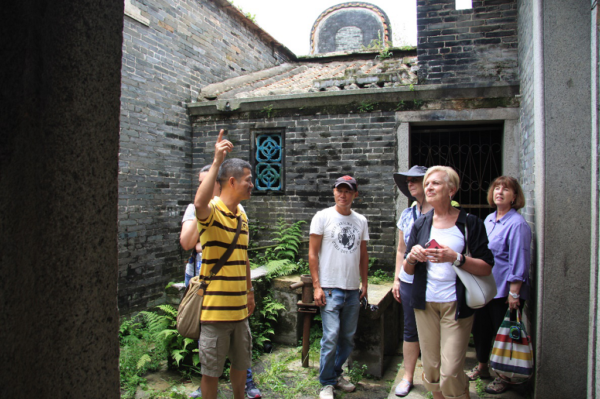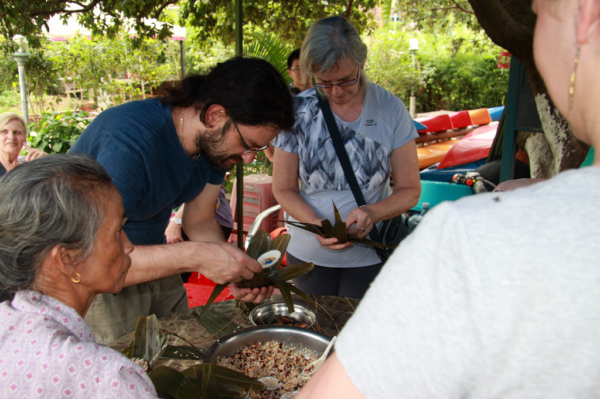In Canton province, an ancient village lies at the north central part of Sanshui, Foshan City, where eight hundred years ago, the celebrated Chinese poet Yang Wanli of the Southern Song Dynasty (1127-1279) visited. Inspired by the beautiful scenery of thick reeds weaving along the silver river, he left a famous poem named Leaving Early from Qingtang. Qingtangis today’s Lubao Town, originally known as Xukou Town.

Soon after the traditional Dragon Boat Festival had concluded, over 10 of SCUT’s international scholars arrived at Changan, Lubao Town for a one-day dragon boat culture tour. Changan consists of four family-clan villages, the history of which can be traced back to the descendants of Fan Zhongyan (a prominent politician and literary figure in the Northern Song Dynasty), who emigrated from Suzhou all the way south to Guangdong 900 year ago. The villages are surrounded by lotus ponds along the Beijiang River and are shaped like lotus flowers. The architectural style of the ancient villages is well preserved and features the distinctive “panear wall”, where the wall of a house extends above the roof to form a shape resembling the handle of an iron pan. The “panear wall” is the best representative example of Cantonese architecture in these villages.
Behind the Fanjiacun Village, one of the four family-clan villages, there is a large bamboo forest where indocalamus leaves grow. These leaves are one of the raw materials for making Zongzi. Along the secluded path, our international scholars crossed the bamboo forest before arriving at the neighboring Jiangjiacun Village, another family-clan village. Although featuring different styles, the ancestral temples of Fanjiacun Village and Jiangjiacun Village both have well preserved ancient lime and brick sculptures on the walls of their antechamber, inner hall and study room – it’s easy to imagine the scene of scholars busily studying to pass the official examinations. However, many brick walls and lime sculptures have been partly damaged during the long course of time, which poses a great challenge to the local government in their preservations efforts.

For the first time, our international scholars were able to delight in the experience of an idyllic farmhouse built by local villagers themselves. Festive joy still permeates the village despite the Dragon Boat Festival having already past. Hospitable villagers placed various materials on the table to teach their foreign guests how to make Zongzi. An elderly lady, who is in her seventies, was demonstrating how to wrap Zongzi. Meanwhile, another lady was patiently teaching everyone step by step, showing how to pile up layers of Zongzi leaves, how to wrap sticky rice in it, and how to fasten it with seaweed. By making Zongzi on their own, these foreign guests were able to fully experience the joy brought by traditions of the Chinese Dragon Boat Festival.
As the end of the trip drew near, most of our foreign teachers were reluctant to leave. One of the teachers, whom had never set foot in a Chinese village before, told us that in the past it was hard for her to imagine what the Chinese countryside looked like when she heard her students talking about their remote village hometowns. With today’s trip, she finally was able to experience it firsthand.
The One Day Tour is an annual event of the International Scholars Club, organized by the SCUT International Office. Through initiating various cultural activities, the Club aims to spread Chinese culture among SCUT foreign teachers and therefore enhance cross-cultural exchange and cooperation.
Edited by Susan, proofread by Paul Winning
International Scholars Office
South China University of Technology
INTERNATIONAL OFFICE, OFFICE FOR HONG KONG, MACAO & TAIWAN AFFARIS
Copyright 2015 South China University of Technology. All Rights Reserved. 粤ICP备05084312号
Contact Us
Room 345-346, Building 37,
Wushan Campus, South China University of Technology,
Wushan Road, Tianhe District, Guangzhou, P. R. China



